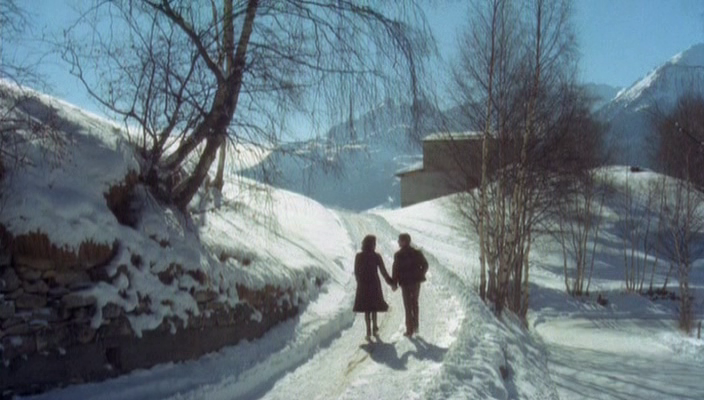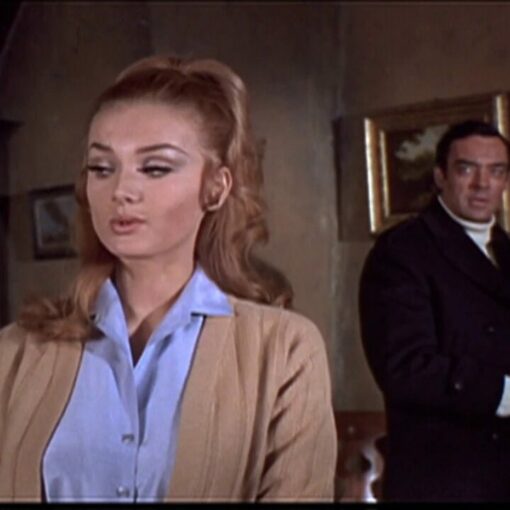A Brief Vacation (1973) is an Italian drama directed by Vittorio De Sica who received European David at the David di Donatello awards in 1973 for this opus.
A diligent Milanese factory worker Clara Mataro (Florinda Bolkan) is jaded with her obnoxiously monotonous lot mostly consisting of pampering her selfish husband Franco (Renato Salvatori) and travailing in her lurid working place. One day, upon being examined by a doctor, she is sent with tuberculosis to a remote sanatorium in the Alps where she sees the world from an absolutely new perspective…

“The movie is like a smouldering candle warming its viewer with its humanistic flame”
The phenomenal Italian director Vittorio De Sica compassionately executes this excruciatingly poignant tale overflowing with candour and simplicity which depicts the life of a simple woman prostrate with her arduous labour which gives her everything but joy. Not only is the protagonist compelled to support her family which is financially enfeebled owing to the fact that her consort is incapable of finding any decent job with his broken leg which he injured while riding a motorcycle, but she is also forced to abide her relatives’ egocentrism and quotidian obstacles which gradually emaciate her already exhausted soul. The overwhelming sense of desolation is masterfully enhanced by De Sica through utilising sordid, autumnal panorama of murky urban suburbs and the sentiment of indigence is intensified by employing claustrophobic, blue-collar workers’ flats which seem to be replete with sadness and despair. The further the A Brief Vacation goes, the more joyous presented images appear and Clara’s transitional liberation from her onerous life reminiscent of a dreary nightmare is tacitly congruous with the film’s visual aspect, for De Sica considerately illuminates the glum stage of Clara’s fate with gradually more lambent hues. It is likewise the time in which Clara encounters the only gesture of amiability which comes from a totally unknown man whom she meets while waiting for her turn to be examined by a medic. The young male proves to be a patient too and on discerning some bitterness in her behaviour, he strives to console her in her difficult position in the act of pure kindness – something very sporadic throughout her dispiriting lifetime.

Once Clara is delegated to recuperate at a sanatorium in the Alps, the motion picture acquires a modicum of fable-like atmosphere which comforts both most significantly the viewer and conspicuously Clara whose endless and gruelling struggle comes to an end which enables her to look at the things perceptively minus being hastened by her professional or motherly duties. De Sica adroitly emphasises his camera on the main hero and as a corollary, we follow the plot almost through her eyes, just like Clara, avidly gloating over the beauty of winter scenery and peering at new faces. The first day at the sanatorium comes as a shock to Clara who seems to be virtually bemused by the miraculous transition and De Sica outstandingly likens her new room to her indigent Milanese flat cluttered with odds and ends, exposing the smashing spatial contrast between both places. Likewise, the serenity which Clara sustains directly after her arrival at the sanatorium is striking and perfectly punctuates her inner spirits. Subsequently, the concert to which the female patient Scanziani (Adriani Asti) invites Clara and two other women obtains a special meaning. The moment becomes the narrative centre during which Clara runs into the man with whom she talked to while waiting to be examined by a doctor, while other females heal their psychological wounds with the beauteousness of the music. This narrative factor of A Brief Vacation immensely underpins the plot which does not pivot around its romance or the protagonist’s recovery, but likewise gives a lot of room to its secondary characters. Ultimately, it also sinks in that the greatest therapy for Clara is assisting other patients grappling with their own nuisances in the depths of their souls.

The performance by Florinda Bolkan is fervent, convincing and exquisitely subtle. Bolkan genuinely knows how to enact the role demanding a great deal of delicacy and sensitivity. Renato Salvatori is no less satisfying as her self-centred husband who requires much more from his wife than he does from himself. Daniel Quenaud’s acting and role might not be particularly prominent, but his distinctive appearance caters for contingent deficiency in uniqueness of the part of Clara’s lover. Other gracious performances are conveyed by Anna Carena and Adriana Asti.

The music by Manuel De Sica appears quite sentimental, but never excessively obtrusive, as it mostly remains in the background, not prejudicing the motion picture with unnecessarily strident or discordant tones. The cinematography by Ennio Guarnieri auspiciously captures the overwhelming metamorphosis of Clara’s life by juxtaposing her everyday environment lushly framed in steel, clustered objects and people with her recuperation at the sanatorium where the occurrences are profusely aestheticized with glass, snow and hollow spaces.

A Brief Vacation is like a smouldering candle warming its viewer with its humanistic flame that outlasts even after being doused by the film’s running time. What enraptures about De Sica’s vibrant and enthralling tale is that despite tackling exceedingly serious topics of suffering, death and agonising life condition of pauperised citizens, apart from leaving a bitter-sweet after taste, it also yields loads of invigoration in its captivatingly beautiful portray of creamy snowdrifts, mountains as well as airy, lustrous corridors filled with cries and pains of ever-passing patients in search for their physical and spiritual recovery.
Verdict: 8/10 stars – excellent






